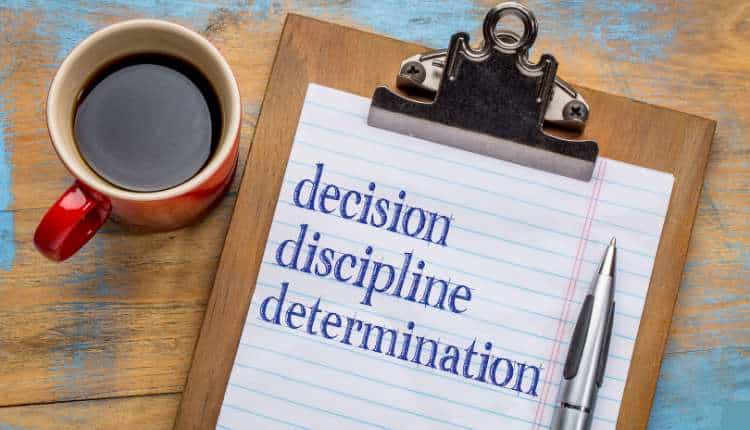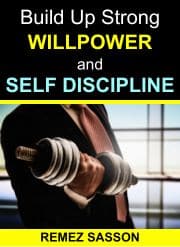
Have you ever felt like you’re trying to be everything to everyone, disciplined in every area of life?
From career to relationships, parenting to personal fitness, the pressure to excel in all aspects is exhausting. At least for me, sometimes it feels like I constantly have a football coach by my side, always screaming in my ear to pick up the pace.
It’s like a constant tug-of-war with yourself, willing discipline and willpower into every decision. But here’s the thing: believing you need willpower for everything is a trap, leading to burnout, frustration, and a lack of real focus on what truly matters. Trust me, I have learned and continue to be reminded of this lie.
Browse our online courses on meditation, positive thinking, overcoming procrastination, and freedom from distractions.
Imagine the freedom of knowing you don’t need to apply willpower everywhere, just in a few carefully chosen areas. This is the power of selective discipline.
Let’s explore the myths around willpower and discipline and uncover a new approach that leaves you feeling empowered rather than drained.
Debunking the Myths: Why Willpower Isn’t Infinite
Many of us grow up thinking that willpower is an unlimited resource, something you either have or don’t, or that you can draw upon indefinitely.
But science, as well as personal experience, reveals that willpower is more like a muscle. It strengthens with use but can also become fatigued. According to research by Muraven and Baumeister, self-control relies on a limited, consumable resource that diminishes with repeated exertion.
This “ego depletion” means that, similar to how a muscle tires with physical effort, our willpower becomes temporarily exhausted after repeated acts of self-control. Imagine working out for hours on end without a break; eventually, you’ll hit a wall.
Willpower works similarly. Research shows that attempting to apply it in every area of life leads to exhaustion, diminishing returns, and, ultimately, burnout. The truth is that willpower is finite, and to cultivate it wisely, we need to choose where we spend it.
Selective Discipline: Focusing on What Truly Matters
Instead of spreading discipline thin across all aspects of life, selective discipline allows you to focus on a few key areas that align with your goals and values.
This concept, as Gary Keller discusses in The One Thing, is about selecting where to be disciplined rather than trying to be a master of all. If you think about the world’s most successful athletes or entrepreneurs, you’ll notice a pattern-they excel in one area but may struggle in others.
Take a pro athlete, for example. They channel immense discipline into training and competing, but that doesn’t mean they excel in every area of life.
Often, we hear stories of athletes who struggle with finances or relationships because they’re using up their willpower in their chosen field. The same goes for entrepreneurs. We hear about the scandals they face, whether with their partners or how they treat others.
We can achieve meaningful results by focusing discipline on a few critical areas without depleting ourselves.
Willpower vs. Discipline: Understanding the Difference
It’s essential to understand that willpower and discipline, while interconnected, are not the same.
Willpower is that initial push to resist a temptation or begin a challenging task, while discipline is the consistent structure we apply over time. Think of willpower as the spark that lights the fire and discipline as the fuel that keeps it burning.
Understanding this difference allows you to reserve willpower for those “spark” moments, while selective discipline provides ongoing support in your chosen areas.
How Overextending Discipline and Willpower Leads to Burnout
When we attempt to be disciplined in every area of our lives, we set ourselves up for failure. The reality is that trying to be “perfectly disciplined” across the board leads to burnout.
Imagine trying to juggle the roles of an exceptional businessperson, present parent, supportive partner, health enthusiast, and disciplined saver-all at once. By spreading ourselves so thin, we reduce our effectiveness everywhere.
It’s also why we are constantly reminded as business owners to begin delegating certain tasks and activities to others. This way, we can focus on not only what’s most important, i.e., family time, business, etc, but also so we can have more time to focus on what we are best at.
Burnout is the natural consequence of this overextension. When you overuse willpower and attempt to apply discipline universally, you quickly find yourself running on empty, struggling to keep up, and often failing to achieve meaningful results.
Lessons from Top Performers: Applying Selective Discipline
Selective discipline isn’t about giving up but being smart with your resources. You can make a greater impact without exhausting yourself by channeling discipline into the areas of life that align with your values.
For example, in my entrepreneurial journey, I’ve poured intense focus into building my business and increasing my income and impact.
The demands of a 12- to 14-hour workday mean my willpower is largely spent by the time I get home. This often leaves me without the energy to make healthy food choices or to be as present as I’d like with family. This isn’t because I lack willpower but because I’m using it strategically in areas that matter most to my goals.
Aligning Discipline with Your Values and Priorities
Selective discipline works best when aligned with your values. If we have too many values or priorities, we end up with none at all. Instead, ask yourself: What matters most to me? Is it my career, my relationships, my health?
By identifying your top values, you can choose a few areas to apply discipline and let go of the unrealistic expectation to be “perfect” in all aspects.
Take time to reflect on your top priorities. Maybe it’s career growth, family time, or personal health and financial stability. Whatever it is, being selective with your discipline ensures you’re giving your best where it truly matters.
Letting Go of Perfectionism: The Power of Imperfect Discipline
A big part of selective discipline is releasing the need for perfection. The drive to be perfect in everything-whether it’s work, family, fitness, or finances-is a setup for failure. Perfectionism isn’t about achieving success; it’s about fear of failure.
By embracing selective discipline, you give yourself permission to focus on a few critical areas, doing them well rather than spreading yourself thin trying to do everything perfectly.
This approach not only enhances effectiveness but also promotes a sense of inner peace, as you’re no longer chasing impossible standards.
Practical Steps to Cultivate Willpower and Discipline in Key Areas
- Identify Your Top Values: Reflect on what matters most to you and pick a few areas where you want to apply discipline.
- Start Small: Begin with one or two areas rather than trying to overhaul your entire life. For instance, if health and career are priorities, focus on daily practices that strengthen those.
- Set Boundaries: Make it clear to yourself where you’re willing to invest your energy and where you’re not. Let go of activities or commitments that drain your willpower without adding value.
- Schedule Rest: Just as athletes need recovery, so does your willpower. Make time to rest and recharge, allowing you to return to your focus areas with renewed energy.
- Track Progress and Reassess: Regularly check in with yourself to ensure you’re on track. Life changes, and so can your focus areas.
Making Peace with Your Limits: Recognizing When to Rest
Willpower is finite, and recognizing this truth is an act of self-compassion. Rest isn’t a reward; it’s a necessity. By respecting your limits, you can cultivate a sustainable approach to willpower and discipline without burning out.
This mindset shift allows you to embrace selective discipline as a way to protect your mental and physical well-being.
Putting It All Together: Your Roadmap to Selective Discipline
The journey to cultivating discipline and willpower is personal, and it’s ongoing. By focusing on selective discipline, you’re not giving up on improvement; you’re simply choosing where to excel.
Rather than exhausting yourself in every area, prioritize the parts of life that bring you the most fulfillment. In doing so, you’ll not only increase your effectiveness but also experience a greater sense of peace and satisfaction.
Let go of perfectionism. Focus your willpower on what matters most, and see the difference selective discipline can make in your life.
About the Author
Eddy Green is a life coach and personal growth advocate who’s driven by a deep commitment to self-discovery and resilience. Having transformed his own life through discipline and introspection, he now shares personal insights and practical strategies to help others find clarity and direction. Outside of coaching, he’s passionate about Martial Arts, loves caring for rescue dogs, watching anime, and continuously explores new paths to growth, believing that life’s challenges are steppingstones to inner strength and wisdom. Website sagemodecoaching.com/blog

